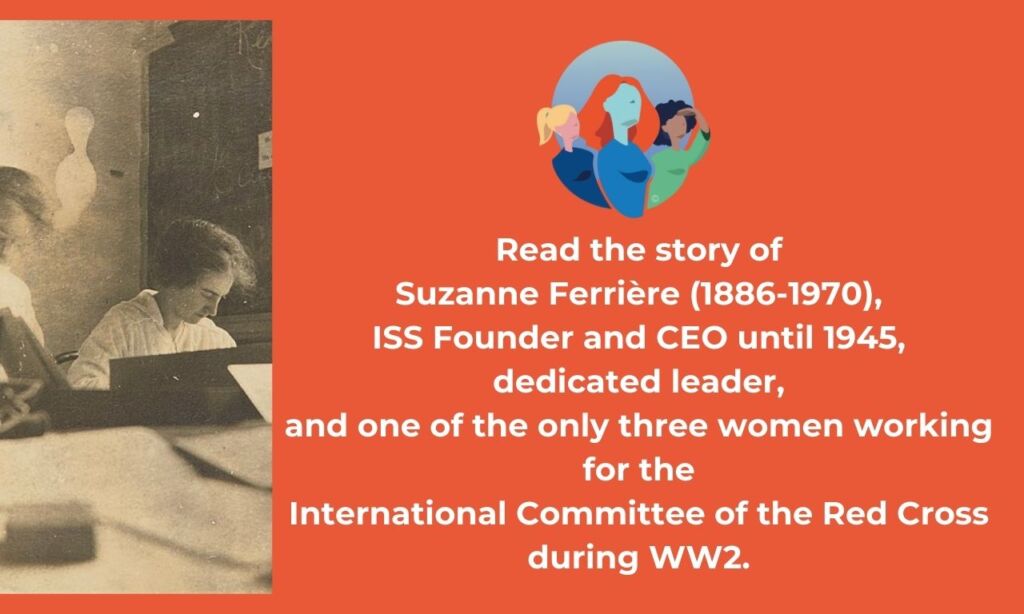
The story of Suzanne Ferrière, ISS Founder and CEO until 1945
- Written by: Apolline Foedit, PhD student in International History, the Graduate Institute, Geneva
- Women explorers
Suzanne Ferrière, born in 1886 in Geneva, Switzerland, emerged as a prominent figure in the field of humanitarian activism, leaving a permanent mark on organizations like the International Committee of the Red Cross (ICRC) and the International Social Service (ISS). Coming from a distinguished Genevan family, Ferrière became the third female member of the ICRC’s governing body.
Her career in humanitarian service began under the guidance of her uncle, Dr. Frédéric Ferrière, member of the ICRC. She initially worked in the Civilians Section of the Central Prisoners of War Agency from 1914 to 1915 before transitioning to the ICRC Relief Section. Notably, her collaboration with Eglantyne Jebb in 1919 led to the establishment of the International Union for Child Welfare, where Ferrière later assumed the role of Secretary-General.
In 1920, Suzanne Ferrière played a pivotal role in the formation of the International Migration Service (IMS), when the Young Women’s Christian Association initiated it as a network of social work agencies aiding migrant women and children. Serving as the IMS Secretary-General until 1945, Ferrière advocated passionately for an international socio-legal framework for cross-border family maintenance claims. The organization, later renamed the International Social Service (ISS), owed much of its success and global impact to Ferrière’s dedicated leadership.
Ferrière’s commitment extended beyond organizational boundaries, as she undertook missions assigned by the ICRC that took her to various parts of the world, including Russia, South America, and Africa. Her intelligence and courage were evident in overcoming obstacles. In distant countries where conventions offered little protection, Ferrière demonstrated an unwavering determination to assist victims.
During World War II, Suzanne Ferrière emerged as an advocate within the ICRC leadership. Her influence extended to shaping relationships with other international organizations and contributing to the establishment of the maintenance convention. The historian Roxana Banu (2023) emphasized Ferrière’s pivotal role in incorporating research findings into reports presented to the Committee for the protection of children.
Suzanne Ferrière’s enduring legacy is defined by her unwavering commitment over several decades, until her passing in 1970, leading the ISS and tirelessly advocating for an international socio-juridical mechanism to ensure cross-border family maintenance. Her strong spirit in confronting adversity, coupled with her ceaseless dedication to humanitarian causes, solidifies her position as a trailblazer in the history of humanitarian activism.
Sources:
Banu, Roxana. “Forgotten Female Actors in Private International Law”. In: Portraits of Women in International Law. Edited by: Immi Tallgren, Oxford University Press. 2023.
Ferrière, Suzanne. « Les Croix-Rouges de l’Amérique du Sud ». Revue Internationale de la Croix-Rouge, online: https://international-review.icrc.org/fr/articles/les-croix-rouges-de-lamerique-du-sud. September 1924.
Ferrière, Suzanne. « Voyage en Syrie ». Revue Internationale de la Croix-Rouge. 12 (133): 7–14. January 1930
Ferrière, Suzanne. « Qu’est-ce que l’International Migration Service ? », Revue Internationale de la Croix-Rouge, seizième année, n°189, septembre 1934, p. 721-731.
Mahood, Linda (2009). Feminism and Voluntary Action: Eglantyne Jebb and Save the Children, 1876–1928. Basingstoke: Palgrave Macmillan. pp. 173, 218, 257–258.
“Death of Miss S. Ferriere, Honorary Member of the ICRC”. International Review of the Red Cross. 109: 210–211. April 1970.